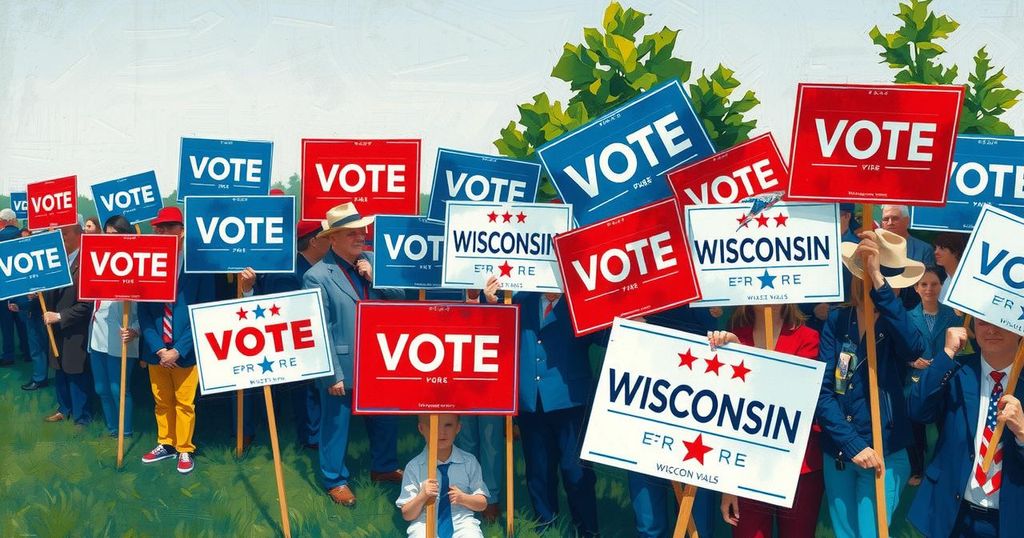Politics
2024 PRESIDENTIAL ELECTION, AFRICA, ASSOCIATED PRESS, DEPARTMENT OF GOVERNMENT, DONALD TRUMP, ELECTION, FOX NEWS, GHANA, LEGISLATION, MUSK, NORTH AMERICA, POLITICS, PRESIDENTIAL ELECTION 2024, SCHIMEL, SUPREME COURT, SUSAN CRAWFORD, TESLA, TRUMP, UNITED STATES, WA, WHITE HOUSE, WIS, WISCONSIN
Isaac Bennett
0 Comments
Liberal Victory in Wisconsin Election Signals Ongoing Political Battle
Liberal candidate Susan Crawford is projected to win Wisconsin’s Supreme Court election against conservative Brad Schimel, echoing a referendum on Trump’s agenda. The race became historic for its funding levels and external influences, including substantial contributions from Elon Musk and others. Crawford’s victory is critical for maintaining progressive control over crucial legal issues facing the state.
In the recent high-profile election in Wisconsin, liberal-leaning candidate Susan Crawford is projected to win, thereby sustaining the progressive majority on the state’s Supreme Court. This court is crucial for addressing significant issues such as congressional redistricting, labor rights, voting access, and abortion rights. The election emerged as a contentious battleground significantly influenced by external financial contributions from various groups, leading to its classification as the most expensive judicial election in U.S. history.
Crawford’s opponent, Brad Schimel, a conservative and former state attorney general, was backed by President Donald Trump. The election became more than a simple judicial race; it evolved into a referendum on Trump’s administration and policies, further complicated by the involvement of billionaire Elon Musk, who supported Schimel through substantial financial contributions.
Musk, known for his roles as CEO of Tesla and SpaceX, donated around $20 million towards Schimel’s campaign, using his influence and resources to sway voters. In a controversial tactic, Musk awarded $1 million checks to early voters at a rally, a move challenged by Wisconsin’s Democratic attorney general but ultimately allowed by the state Supreme Court. Musk emphasized the significance of the election, declaring it essential for the future of civilization and integral to supporting the Trump agenda.
Schimel’s campaign strategy included appealing to Trump’s base, as he leveraged Trump’s endorsement by emphasizing that his election would protect Trump’s policies. He actively campaigned across the state, stating his determination to connect with potential voters, while also receiving backing from influential conservative contributors. Schimel focused on changing perceptions about the court’s objectivity, asserting the election was fundamentally about Wisconsin itself.
Crawford, benefiting from a surge of grassroots support invigorated by opposition to Trump, maintained a strong stance against external influence in judicial matters, explicitly calling out Musk’s substantial financial involvement in an attempt to sway the election. Both candidates recognized the election’s impacts, with Crawford highlighting the potential consequences for fundamental rights and freedoms.
Ultimately, the election witnessed an influx of funding and media attention from both sides, reflecting broader national political currents. Crawford’s victory is poised to counteract ongoing efforts to restrict progressive judicial influence and will shape Wisconsin’s legal landscape for critical issues affecting residents.
In conclusion, the Wisconsin Supreme Court election serves as a significant turning point in the ongoing struggle between liberal and conservative ideologies. Susan Crawford’s projected victory would not only secure progressive judicial decisions but also reflect a larger dissent against the policies of the Trump administration, insulated by notable financial contributions from both sides. This election illustrates the growing influence of outside money in local elections and its implications for the future of governance in battleground states like Wisconsin.
Original Source: www.foxnews.com




Post Comment